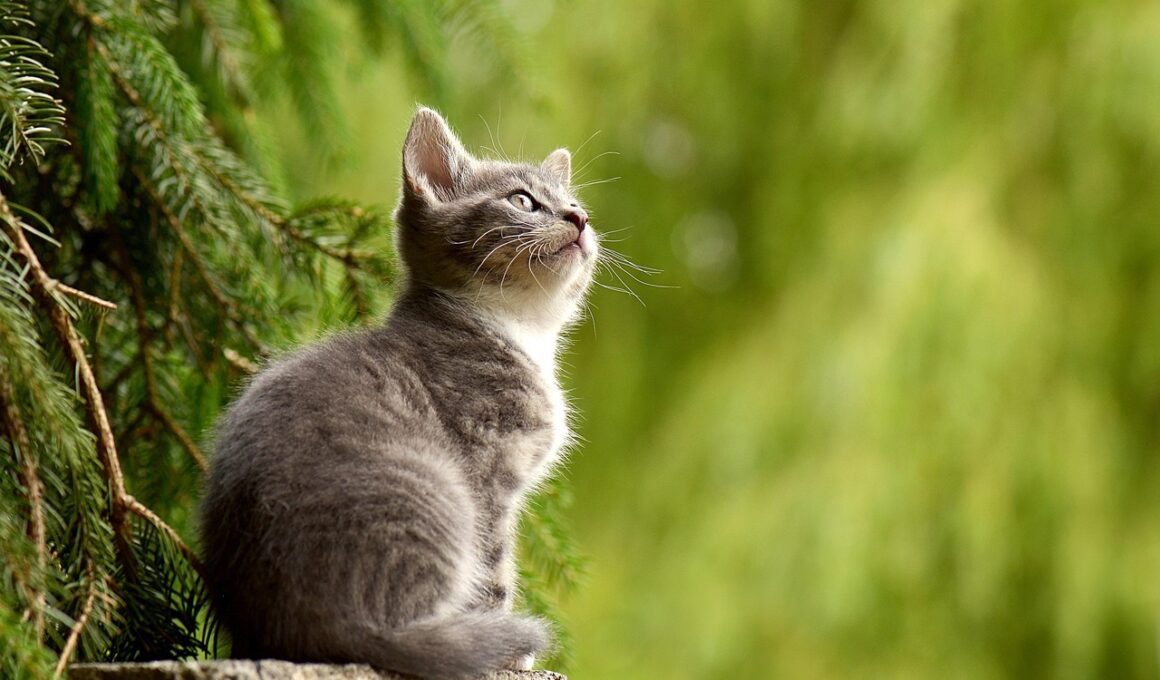Tips for Managing Side Effects After Kitten Vaccinations
Vaccination is a pivotal aspect of kitten healthcare, ensuring they remain healthy and disease-free. After the vaccination, it’s common for kittens to experience some side effects. These can include mild fever, swelling at the injection site, and decreased activity. Understanding these side effects helps owners manage their kittens effectively. Ensuring that your kitten is comfortable post-vaccination can alleviate any anxiety you might have about the side effects. Providing a cozy resting area and plenty of water is essential. Additionally, keeping a close eye on their behavior can help to identify if any unusual patterns emerge. If you’re worried about any severe reactions, be prepared to contact your veterinarian immediately. Familiarizing yourself with normal post-vaccination behavior will make it easier to differentiate between minor and serious issues. Also, observe your kitten for any signs of an allergic reaction, such as persistent vomiting, excessive swelling, or severe lethargy. Having a plan in place, like knowing your vet’s emergency contact information, sets a proactive tone for managing their health.
Ensuring a smooth recovery from vaccinations requires some attention from you as a pet owner. Firstly, limit their activity post-vaccination day to allow them time to recover fully. This means encouraging them to rest without pushing them to engage in play. A gentle approach is best, focusing on nurturing their comfort. It’s perfectly normal for a kitten not to be their usual active self after a vaccine. Monitor their food and water intake closely, as some kittens may lose interest in eating for a short time post-vaccination. If this occurs, try offering their favorite treats or food to stimulate their appetite. Additionally, consider ensuring a safe, quiet space free from distractions where they feel secure. For the first 24 hours after vaccination, being diligent in maintaining their environment will help immensely. Should any side effects intensify or persist longer than expected, it can be beneficial to consult with your veterinarian for advice. Understanding the typical vaccine timeline and recovery can streamline the post-vaccination process for both you and your kitten.
Recognizing Common Side Effects
After vaccination, it’s vital to recognize common side effects specific to kittens. Typical reactions may include mild fever, localized swelling at the injection site, and fatigue. These symptoms usually resolve within a day or two and are signs that the body is building protection against viruses. Swelling at the injection site might be noticeable, but this is relatively normal. Keeping track of any swelling can help differentiate between a standard reaction and a possible complication. If swelling persists beyond three days or grows larger, it warrants a consultation with your veterinarian. Additionally, observe your kitten for excessive irritability or distress in the days following their vaccination. While some lethargy is expected, extreme lethargy or disinterest in their surroundings can signal a need for professional assessment. A gentle and calm environment can help ease any discomfort they experience. Maintaining detailed notes of your kitten’s reactions will also assist in future visits to the vet if necessary. Knowing what is typical allows for better management of their post-vaccination health.
Providing comfort during recovery is essential in ensuring your kitten heals well. Ensure that they have access to a warm, quiet place where they can rest undisturbed. Cats are creatures of comfort and will quickly seek out soft spaces. You can provide blankets or cushioned surfaces to encourage them to curl up and relax. An appropriate environment is crucial, as it will help them to feel safer and more secure while recovering from vaccinations. It’s also an opportunity to bond; offering gentle petting or cuddling can reassure them. Ensure that their eating and drinking areas are easily accessible to them. If they’re unwilling to move around, consider placing food and water near their resting spots. Providing nutritious soft food may also enhance their appetite during recovery. Moreover, observing their litter box habits is essential since a lack of bowel movement might indicate distress. Remember, every kitten is unique, and while many will bounce back quickly, others may need a bit more time. Always be attentive during this period and keep communication open with your veterinarian.
Hydration and Nutrition Post-Vaccination
Hydration and proper nutrition during recovery from vaccinations are paramount. Kittens often experience slight reductions in appetite or drink less water after a vaccine. Ensuring they remain well-hydrated is crucial, as it supports their immune response and helps mitigate side effects. You can encourage your kitten to drink by providing fresh water in clean, shallow dishes. If you’re concerned about hydration levels, consider offering wet food or even adding a bit of water to their kibble to make it easier for them to consume. Nutrition plays a vital role; high-quality kitten food packed with protein and essential nutrients fosters recovery. Monitor their food intake closely, opting for their favorite brands if needed to entice them to eat. A mixture of wet and dry food can also manage their appetite while preventing dehydration. Should they show prolonged disinterest in food or water, this could signal a developing issue necessitating veterinary advice. A balanced diet tailored for kittens lays the foundation for a robust immune system, making it easier for them to get through recovery smoothly.
Additionally, familiarity with your kitten’s vaccination schedule will help you anticipate their needs. Typical vaccinations occur between 6 to 16 weeks of age, with booster shots needed thereafter. Understanding this timeline lets you prepare ahead for their vaccinations and recovery. Prioritize scheduling appointments during times when you are available to monitor them closely afterward. Each kitten may have varying responses to their vaccinations; thus, keeping a log of their behaviors and any noted side effects will be invaluable for discussions with your vet. If your kitten has a previous health condition, be sure your veterinarian is aware before vaccination, as this may influence their recovery route. On the day of vaccination, while it’s important to comfort your kitten, do note any specific instructions given by your veterinarian regarding post-care. Completing follow-up vaccinations on time ensures their immunity remains optimal. The knowledge you gain pays off immensely in providing excellent care for your kitten. Building a supportive, proactive environment eases their transition into each stage of growth.
When to Contact the Veterinarian
Understanding when to reach out to your veterinarian can make a significant difference. If your kitten exhibits severe side effects or unusual behaviors, such as high fever or seizures, do not hesitate to seek immediate advice. While most kittens recover smoothly from vaccinations, knowing which signs warrant concern is critical. Any persistent vomiting, diarrhea, or lethargy that lasts longer than a day should raise red flags. It’s also important to recognize respiratory issues; if your kitten struggles to breathe or develops a cough, prompt medical attention is necessary. Struggles in moving or signs of pain are also cause for concern and require an assessment. Lastly, should you notice any swelling that does not dissipate or worsens over time, you should consult your veterinarian without delay. Keeping lines of communication open with your veterinarian aids in decision-making, ensuring your kitten receives the best care possible. Trust your instincts as an owner; if something doesn’t seem right, it’s better to be safe while addressing your kitten’s health concerns.
In conclusion, managing post-vaccination side effects for kittens is about being vigilant and prepared. The journey begins with understanding the normal side effects of vaccination to distinguish between standard reactions and those that need medical attention. Create a peaceful environment for your kitten during their recovery period, allowing them the space needed to rest. Nutrition and hydration play a pivotal role in their recovery, so ensure they have access to high-quality food and water. Being observant of their behavior and wellbeing is fundamental; it helps identify any deviations from the standard recovery process. Always have open dialogue with your veterinarian, especially if your kitten has a history of health issues or exhibits concerning symptoms. A proactive approach in monitoring and supporting their health after vaccination will not only ease their recovery but will also strengthen your bond with your pet. The joy of seeing your kitten healthy and thriving post-vaccination is an experience every pet owner cherishes. Remember, your attentiveness and care significantly contribute to their overall health and happiness.


